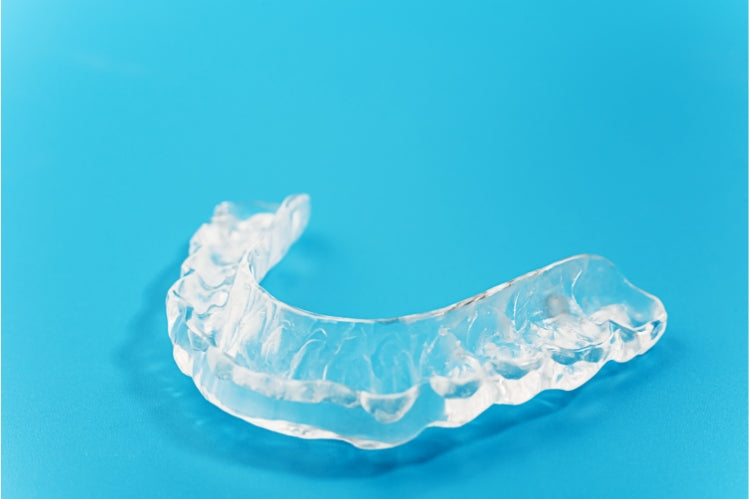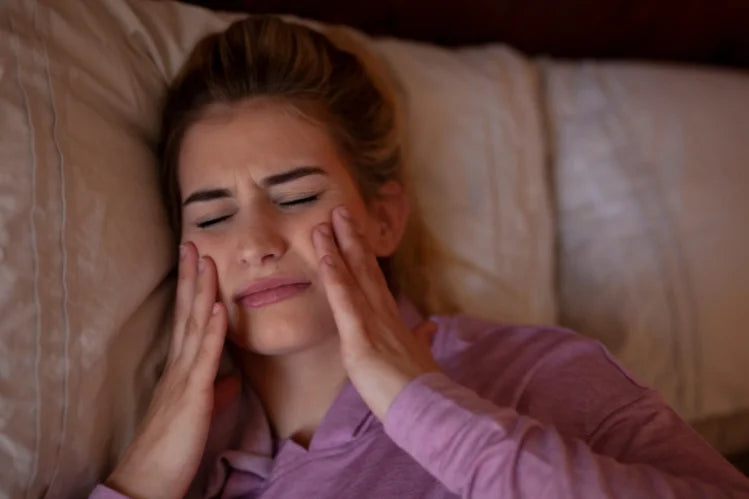
Table of Contents
- Understanding Snoring
- What are The Causes of Snoring
- How To Stop Snoring Naturally?
- 1. Change Sleeping Position
- 2. Exchange Your Pillow
- 3. Weight Loss
- 4. Mouth Exercises
- 5. Limit Alcohol
- What are Anti-Snoring Mouth Guards?
- Types of Anti-Snoring Mouth Guards
- Benefits of Using Anti-Snoring Mouth Guards
- How To Keep Your Anti-Snoring Mouth Guard Clean?
- FAQs
Do you wake up with a severe headache and restlessness in the morning? If so, this is one of the symptoms of snoring at night. Not just this but it also leads to discomfort and unpleasant sleep leaving your throat completely dry. To avoid further health issues you need to treat it as early as possible.
There are multiple natural ways you can opt for to treat snoring. But what if you still experience snoring? Good news! Considering your dental requirements, orthodontics has introduced the best solution for you. You can now protect your smile and say goodbye to snoring by wearing an anti-snoring mouth guard. In this blog, we will explore ways to stop snoring naturally and understand how helpful are the anti-snoring mouth guards.
Understanding Snoring
Snoring is an involuntary rattling sound produced by people while sleeping. It occurs due to the blockage of airways caused either by either nasal congestion or any other health issue. Snoring is a common issue faced by many people but it is important to get it treated before it becomes chronic.
What are The Causes of Snoring
To treat snoring, understand its causes first. The following will help you in this regard:
Age Factor
Aging is one of the common causes of snoring. When people age, the throat muscles get weakened leading to more relaxed airways. This causes the airways to vibrate leading to snoring at night.
High Alcohol Consumption
The high consumption of alcohol relaxes the soft tissues, making it a favorable condition for snoring.
Allergies
Severe allergies such as nasal blockage, congestion, and sneezing can cause airway inflammation. This further troubles your breathing and leads to snoring.
Obesity
More fat around the neck can put pressure on the airways, so people with increased weight have higher chances of snoring.
Bruxism
Bruxism is a dental condition referring to excessive teeth grinding and clenching at night. When a person grinds teeth, the tongue moves back and partially blocks the airways leading to snoring. Both these conditions are not always linked together but if you are experiencing both, there is a higher chance of bruxism leading to snoring.
How To Stop Snoring Naturally?
Multiple natural ways can help you prevent snoring at night time. The following are some of the tips:
1. Change Sleeping Position
When you are lying straight on the bed, your tongue meets the back of your mouth blocking the breathing passage. Therefore, sleeping on your side will allow easy airflow and prevent rattling sound.
2. Exchange Your Pillow

Allergic agents present in your pillow can be the reason for snoring. As they lead to severe allergic reactions such as sneezing they can impact your breathing causing snoring at night.
Furthermore, make sure you use a pillow that elevates your head. This helps to reduce the nasal congestion and relaxes the throat muscles. Therefore, keep your pillow in check and replace it with a suitable one.
3. Weight Loss
Excessive fat around the neck partially blocks the airways, leading to snoring. To prevent this, losing weight eliminates fat around the neck and prevents the blockage. You can easily lose weight with the intake of a healthy diet and exercising regularly.
4. Mouth Exercises
Mouth exercises are one of the easiest ways to prevent snoring. The following are some of the exercises you can opt for:
Tongue Slide
Place the tip of your tongue against the upper palate and move it back and forth. Repeat the process for 5 to 10 minutes which will help straighten your tongue and throat muscles.
Tongue Stretch
Take your tongue out as far as you can and hold for 10 to 15 seconds. Repeat the process at least 5 times to increase tongue strength.
5. Limit Alcohol
If you intake excessive alcohol in a day, it is time for you to avoid it. Limit the intake and keep your throat muscles healthier. However, the intake of alcohol also compromises your sleep quality and offers restlessness.
What are Anti-Snoring Mouth Guards?

Anti-snoring mouth guards also known as snore guards are made of flexible and durable material. This dental equipment is designed perfectly according to the size of your mouth, considering your comfort and perfect fit.
When you wear them at night, they reposition your lower jaw and tongue preventing the blockage of your airways. A snoring mouth guard puts pressure on your lower jaw muscles and slightly pushes them forward.
Types of Anti-Snoring Mouth Guards
The following are two important types of anti-snoring mouth guards:
1. Mandibular Advancements Devices
MAD is responsible for keeping the lower jaw forward which eases the airflow while sleeping.
2. Tongue Retaining Devices
TRD keeps your tongue forward with the help of a suction bulb, preventing it from falling backward.
Benefits of Using Anti-Snoring Mouth Guards

The following are some benefits anti-snoring mouth guards offer:
Budget-Friendly Solution
Unlike surgical treatments and solutions, wearing an anti-snoring mouth guard can be budget-friendly. Set the cost range and choose the product accordingly. Make sure it is made of high-quality durable material that lasts long.
Better Sleep Quality
When it comes to your sleep, it is important to have a restful one. Snorers are more likely to have bad-quality sleep. Wearing an anti-snoring mouth guard maintains the airflow and offers better sleep.
Improves Breathing
Anti-snoring mouth guards help improve breathing by keeping your tongue and jaws in place, leading to comfortable sleep.
Customized Fit
Many anti-snoring mouth guards are customized perfectly according to your mouth. This promotes enhanced comfort and prevents a dental device from irritating your gums, cheeks, or tongue.
Portable
Anti-snoring mouth guards are small and easier to carry. If you are someone who travels a lot but wants to have a restful sleep, you can easily take a portable anti-snoring mouth guard with you anywhere.
How To Keep Your Anti-Snoring Mouth Guard Clean?
Considering the longevity of your dental product, the following is how you can keep it clean:
Proper Hygiene
When it comes to maintaining your anti-snoring mouth guards, proper hygiene plays an important role. Properly brush and floss your smile twice a day and prevent plaque development. With improved dental hygiene you can keep your mouth guard maintained as well.
Regular Cleaning
After each use, make sure you properly clean your dental device. As an anti-snoring mouth guard stays inside your mouth throughout the night, there are higher chances of plaque development. Before placing it inside your mouth rinse it under water to make sure no dust remains on it. Repeat the process after removing it to rinse off saliva or debris.
Proper Storage
Ensure proper storage of your mouth guard. When you take it off, avoid placing it anywhere which makes it catch bacteria and germs. Make sure the case is clean and dry to avoid bacterial growth.
To sum it up, snoring can disturb your sleep leading to restlessness. There are multiple reasons a person might experience snoring such as allergies, obesity, and bruxism. Considering your sleep quality, orthodontics has introduced dental equipment for your smile. By wearing an anti-snoring mouth guard you can maintain the airflow and have a restful sleep.
FAQs
1. What is the solution for stopping snoring?
You can avoid snoring by changing your sleep position, losing weight, avoiding alcohol, and wearing an anti-snoring mouth guard.
2. How do mouth guards for snoring work?
Mouth guards for snoring work on the technique called mandibular repositioning. When you wear an anti-snoring mouth guard, it keeps your lower jaw slightly forward so that the airway is opened.
3. Is there a permanent way to stop snoring?
In severe cases of snoring, your dentist might recommend a surgical method. But for mild to moderate conditions, you can wear an anti-snoising mouth guard.
4. Is snoring a disease?
Snoring while you are asleep does not mean you have a disease it indicates that you might have a serious sleep disorder. People going through sleep apnea are more likely to have snoring issues.
5. What is the best thing for mouth snoring?
Mouth exercises are the best thing for snoring. These exercises help relax your throat muscles and prevent snoring at night.




